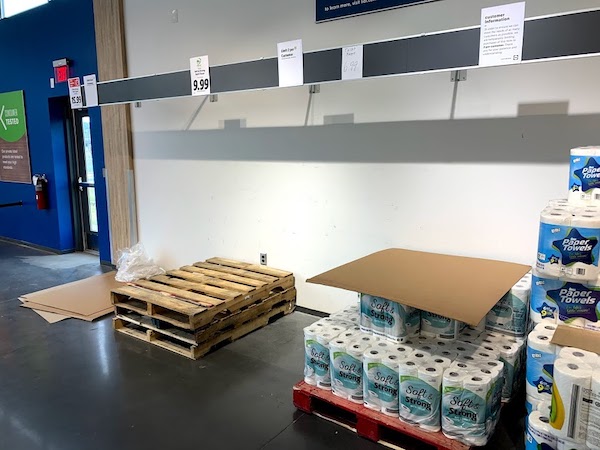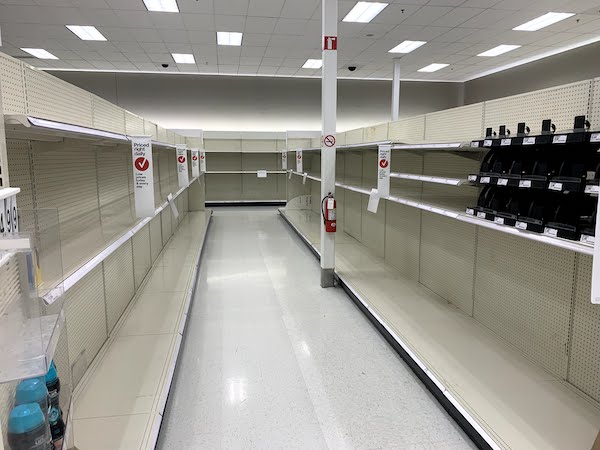COVID-19 and Procurement and Supply Management
 What has caused shortages during the COVID-19 pandemic? What can procurement and supply management professionals do to help mitigate the effects of supply chain disruption? We thought we would ask G'Sean Williams, the lead instructor of the UNC Charlotte Continuing Education Procurement and Supply Management Certificate Program. Mr. Williams is currently the Executive Director of Supply Management and Supplier Performance at SMS-Advisors. Prior to SMS-Advisors, he held various Manager and Director level positions in Procurement & Supply Chain for Intel, WestRock, and Bristol Myers Squibb to name a few.
What has caused shortages during the COVID-19 pandemic? What can procurement and supply management professionals do to help mitigate the effects of supply chain disruption? We thought we would ask G'Sean Williams, the lead instructor of the UNC Charlotte Continuing Education Procurement and Supply Management Certificate Program. Mr. Williams is currently the Executive Director of Supply Management and Supplier Performance at SMS-Advisors. Prior to SMS-Advisors, he held various Manager and Director level positions in Procurement & Supply Chain for Intel, WestRock, and Bristol Myers Squibb to name a few.
In this recorded interview, G'Sean answered some questions about the recent shock to the supply chain and how procurement and supply chain professionals can better prepare for future disruptions.
Watch the interview here:
Q. How has COVID-19 disrupted the supply chain?

A: [For example,] let's take bathroom tissues. You have a scenario where you produce in a supply chain a certain amount of commercial bathroom tissue for industry and companies, and then you produce a certain amount of residential bathroom tissues for our house. You walk into a retail store or a grocery store, and there's no bathroom tissue on the shelf. You're like, "What has happened?" But that's because of the inventory levels.
People were like, "I don't know if there's going to be any left." And so, you buy, buy, buy, and inventory levels reduce. And so, that supply chain needs time to catch up with that. And then we still haven't caught up completely.
You got to be able to turn that supply chain on. It doesn't happen from, "let's just make more bathroom tissue." No, you've got to go through and get the natural resources, whether it's a synthetic chemical or whether it's cotton. You got to pick it from the field if it's cotton. And that, somehow, over the course of a supply chain, becomes bathroom tissue...
So COVID has challenged our supply chains and have driven a lot of products out [of stock] in marketplace, whether we're hoarding it, or it's needed, or extra demand in the medical industry, with hospitals... [we] just need more.
Q. How important is innovation for the supply chain?
A: The last piece is innovation. Because we're looking at a scenario where [if] you can't get it, you got to figure it out as a procurement and supply chain professional. So I think about hand sanitizer. There's a big group of companies that produce hand sanitizer, but not a lot pre-COVID-19. And so now you have the opportunity for distilleries to get in the game. You didn't have that before...
And so we've been very innovative in being able to find those types of situations. Where we have an apparel industry that's not doing so well because retail is not doing so well, flip that over. And now you have cloth face masks. And so that pivoting, that innovation has been critical.
Q. How can procurement and supply chain professionals drive excellence and leadership?
A: We always talk about we need to be a businessman or woman first, and then we need to be a sourcing or procurement and supply chain professional second. And so having that well rounded skillset is going to be key. I can't just go out and purchase product anymore and say, "When are you going to ship it? What's your lead time? And how much is your cost?" No, that's not good enough anymore. We've got to understand risk. We've got to understand reliability...
We got to understand global markets a way that we never had to understand before. Right now to get nitrile gloves, you just can't stroll up to your corner distributor and say, "Give me 25 cases of nitrile gloves." I might have to figure out if I can get them from Malaysia, which I never had to do before in a lot of cases.
So it's forcing us to be more well-rounded, whether we're in a small business for our self, whether we work for a smaller business or whether we work for a large corporation, these skill sets are key to make sure that you're well-rounded, whether for your actual revenue or for the profitability of the company that you work for.
Q. How can procurement and supply chain professionals better prepare for the next disruptive event?

A: The best preparation is prevention. And can we prevent COVID-19? No. But can we prevent our organizations from not being equipped with the right materials? Absolutely. Can we prevent our organizations from not having the right relationships? Absolutely. And so [if] you're getting kind of relaxed and you're not going as deep as you can, and you're not creating business continuity plans when life is normal? Good luck, next time there's a pandemic. So stay on top as professionals. Stay on top of your business continuity plan. Stay on top of your cost management programs... And so I think those are the skill sets in the program that we bring together. And we make sure that professionals are, like I said, businessmen and women first, and then supply chain and procurement professionals second.
Q. What is the job outlook for supply chain employees?
A: Surprisingly, it's great right now. Companies are realizing that we really didn't have the sophisticated supply chain that we needed to keep up with COVID-19... And so you need a certain skill set that can just say, "I was sourcing lumber yesterday. Now you want me to go get N95 masks? What is an N95 mask?"... I need to figure out what money I can save right now. How can I drive costs out of my supply chain to keep my profitability? So it's never been a better moment for us to contribute directly to the bottom line of our organizations.
